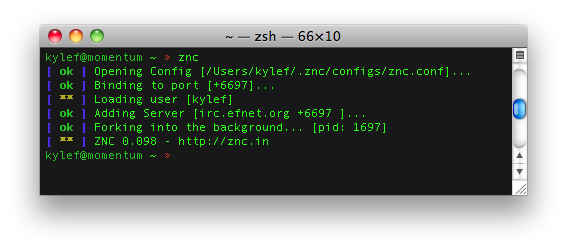To create new wiki account, please join us on #znc at Libera.Chat and ask admins to create a wiki account for you. You can say thanks to spambots for this inconvenience.
ZNC: Difference between revisions
DarthGandalf (talk | contribs) |
DarthGandalf (talk | contribs) |
||
| Line 10: | Line 10: | ||
== Download ZNC {{ZNC-Version}} == | == Download ZNC {{ZNC-Version}} == | ||
You can find the latest stable release '''[http://znc.in/releases/znc-{{ZNC-Version}}.tar.gz <span style="color:# | You can find the latest stable release '''[http://znc.in/releases/znc-{{ZNC-Version}}.tar.gz <span style="color:#7F0000">here</span>]'''! | ||
Or you can try testing version, using [[git]] or from '''[http://znc.in/releases/znc-1.0-alpha1.tar.gz <span style="color:#7F0000">ZNC 1.0-alpha1</span>]''' tarball! | Or you can try testing version, using [[git]] or from '''[http://znc.in/releases/znc-1.0-alpha1.tar.gz <span style="color:#7F0000">ZNC 1.0-alpha1</span>]''' tarball! | ||
Revision as of 13:28, 27 September 2012
Welcome to the ZNC wiki where you may find and publish information about ZNC, an advanced IRC bouncer that is left connected so an IRC client can disconnect/reconnect without losing the chat session. Feel free to update pages which you think are improvable and don't hesitate to ask for help.

You can find us in #znc on EFNet.
The latest stable release is 1.9.1 (ChangeLog).
Download ZNC 1.9.1
You can find the latest stable release here!
Or you can try testing version, using git or from ZNC 1.0-alpha1 tarball!
How does it work?
- Install ZNC on your server.
- Generate an initial configuration via
znc --makeconf.- For each IRC network, you need to create a ZNC user.
- For example, use one user for Freenode, one user for EFnet, one user for Quakenet, etc.
- You can later change settings (add more users, tune existing ones, etc.) via the web interface or from IRC.
- Configure your IRC client to connect to your ZNC server.
- It's a good idea to use
username:passwordas the password in your client, so that (even for broken clients) ZNC can figure out which user you are connecting as.
- It's a good idea to use
- Read the FAQ if you run into any problems. Feel free to ask on IRC if you need more help.
- Enjoy! (Profit?)
Main Features
- Modules
- ZNC supports dynamic loading of C++, Perl, Python and Tcl modules. To get a list of the available modules and more information follow the link.
- Detaching
- ZNC will remain connected to IRC even while you are offline. You can then reattach later and catch up with what happened while you were gone, and your nick (and operator status) will have been kept for you.
- Multiple Users
- You can add additional users under one running process. Useful for public shells that limit background processes. Each user can connect to one IRC network.
- Multiple Clients
- Connect to the same user with as many clients as you want.
- Playback Buffers
- Stay up-to-date with what happened and when it happened while you were detached, timestamps are also printed and can be manually configured.
- SSL Support
- Encryption for both the listen port and connecting to IRC servers. If your system has OpenSSL, ZNC automatically supports SSL connections.
- IPv6 Support
- Both IPv4 and IPv6 address families just work, if your system supports them.
- Partyline
- Using the global partyline module, you can join channels and query users on the internal ZNC network
- Web Administration
- Using the global webadmin module, admins can add/remove/edit users and global settings and non admins can edit their own user settings.

Screenshot of the Webadmin module in action
Getting started
Further Info
- Setting up ident spoofs via oidentd
- Chroot
- ZNC Backup
- Running ZNC as a system daemon
- Using signed SSL cert
- History
Writing modules
External Links
Please note that as of February 2011 we have abandoned SourceForge and moved to GitHub.